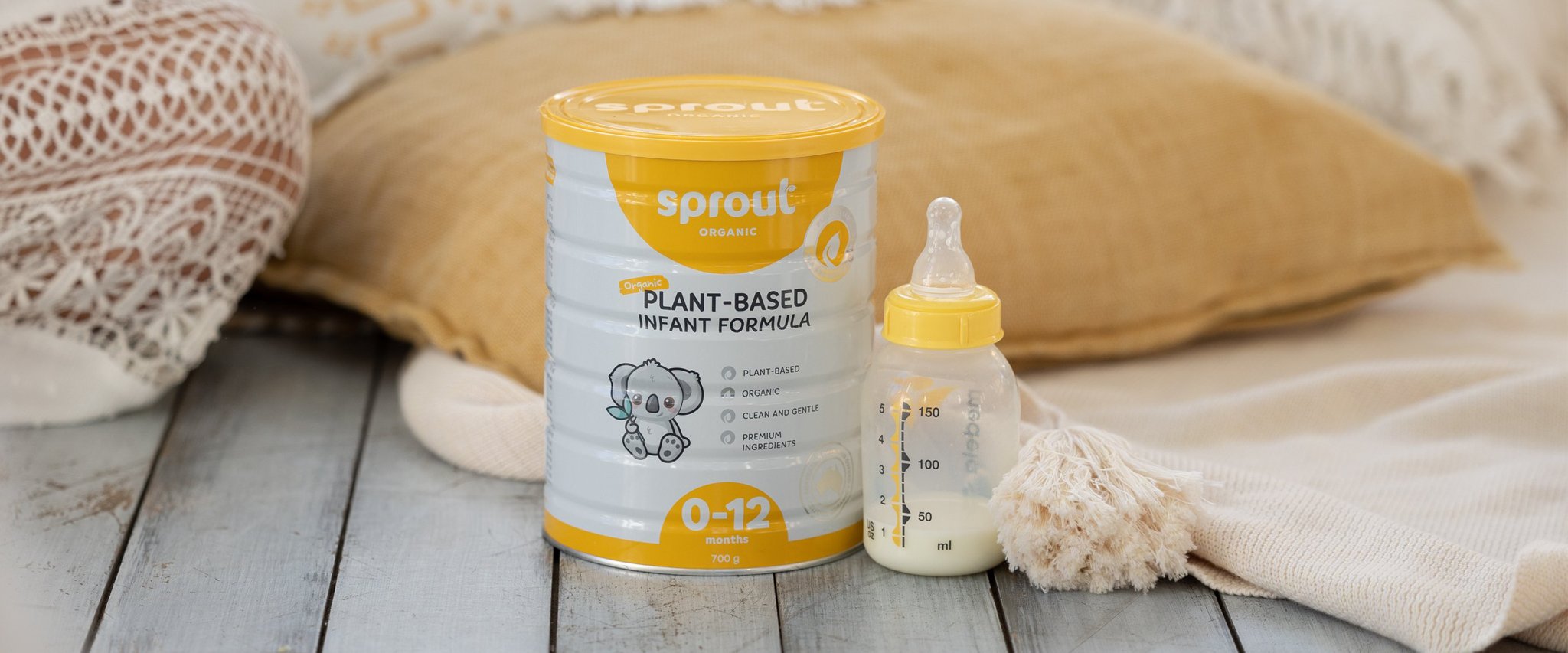The Ultimate Guide to Choosing a Baby Formula: What Every Parent Needs to Know!
Embracing your journey as a parent is a remarkable feat, regardless of the feeding path that follows. Whether you're exclusively breastfeeding, combining breast milk with formula, or solely relying on formula, you're doing an incredible job! Every parent’s journey is unique, and while breast milk remains the primary recommendation for feeding, opting for formula feeding is a safe and suitable option that many families make for various reasons.
Formula, designed to be a comprehensive source of nutrition, aims to mirror the nutritional content of breast milk. During the first six months of your baby's life, whether they are nourished by breast milk, formula, or a mix of both, they receive all the essential nutrients vital for their growth and development.

Navigating the array of formula options available on the market can feel overwhelming. Selecting the right formula involves considering factors such as your baby's nutritional needs and potential dietary requirements. Fortunately, Food Standards Australia and New Zealand (FSANZ) rigorously oversees infant formula production, ensuring that all items meet the essential nutrient standards for infants aged 0-12 months. Nevertheless, specific ingredients in infant formula might warrant your attention to make a conscious choice. Being aware of these components can empower you to make a well-informed decision.
While the process of choosing the ideal formula might seem daunting, this guide aims to ease the process. With the invaluable support of your healthcare team, you'll find the perfect formula match for your little one. Remember, you're doing an outstanding job, and providing love, care, and nourishment to your baby is what truly matters throughout your parenting journey!
WHAT’S IN INFANT FORMULA?
While in Australia there is a wide range of infant formula choices, all products share three major components; carbohydrates, proteins and fats. These elements serve as primary building blocks critical for supporting adequate growth and development in infancy. In addition, all formulas contain a similar amount of vitamins and minerals, which comply with the stringent regulations set out by FSANZ.
THE BASICS
- Carbohydrates are a significant energy source for babies. Typical sources available in formula include; lactose, corn syrup, maltodextrin, rice starch, sucrose, or lactose.
- Protein is the fundamental building block for cells, hair, skin, and organs. The primary protein sources found in infant formula include cow’s milk protein, goats milk protein, hydrolysed proteins of one or more proteins commonly used, and soy protein isolate. To a lesser extent, extensively hydrolysed protein and pea and rice based proteins are also available and can accommodate babies with confirmed cow’s milk protein allergy, intolerance to dairy and/or soy, as well as any religious, dietary or cultural preferences.
- Fats are essential for the adequate growth and development of your little one. A variety of oils are used as typical fat sources in formula and include; palm, canola, rapeseed, sunflower, coconut and corn oil.
- Vitamins and minerals are micronutrients, meaning that small quantities are essential in the diet to maintain adequate growth and functioning. In Australia, FSANZ specifies a minimum and maximum level for vitamins and minerals that must be present in infant formula, so you can be confident that your bub is getting enough.
THE EXTRAS
- Fatty Acids: Breast milk contains two important long-chain fatty acids called Docosahexaenoic acid (DHA) and arachidonic acid (ARA). While it’s not currently mandatory to add DHA and AHA to infant formula in Australia, these fatty acids play a crucial role in the early development of the brain. Therefore, their presence in infant formula can certainly be advantageous.
- Probiotics are live bacteria that have been shown in some instances to have health promoting properties, particularly in relation to gut health. Probiotics added to infant formula are designed to mimic those found in breast milk. Although the research in this area is promising, it is limited and the addition of probiotics in infant formula is not mandated here in Australia. With that said, there is no conclusive evidence of harm associated with the addition of probiotics to infant formula.
- Prebiotics are non-digestible food ingredients that provide a food source to our healthy gut bugs. Prebiotics added to infant formula are inspired by human-milk-oligosaccharides (HMOs) found in breast milk. HMO’s are a crucial element of breast milk, contributing to the development of your little ones gastrointestinal and immune system. The research regarding the addition of prebiotics to formula shows promise, particularly regarding infection reduction. However as the evidence is emerging, there are not strict requirements for their inclusion in infant formula here in Australia.
INGREDIENTS TO AVOID
Thankfully, FSANZ oversees the production of infant formula, guaranteeing compliance with crucial nutrient standards. However, certain ingredients in infant formula might require your attention for a thoughtful selection. Familiarising yourself with these can enable you to make a mindful decision.
- Added sugars - Some infant formulas might contain added sugars or syrups to improve palatability. While these sugars are generally considered safe in small amounts, excessive sugar consumption at a young age may lead to health issues later in life.
- Synthetic additives – preservatives, colourings and flavourings. While these are deemed safe by regulatory bodies within specified limits, some parents prefer formulas without these additives.
- Palm Oil – concerns regarding sustainability and environmental issues associated with palm oil production mean that some parents prefer formula free from this oil.
- Carrageenan – used as a thickener/stabiliser in some formulas. Some studies suggest it may cause inflammation or digestive issues. At this stage, regulatory bodies deem it safe however, if possible it may be best to avoid formulas containing this.
WHAT OTHER FACTORS SHOULD I CONSIDER?
ALLERGIES & INTOLERANCES
Some infants may experience challenges digesting larger protein particles found in standard infant formulas. As such, they may require partially or extensively hydrolysed products. Put simply, this means that the proteins in the formula have been broken down, making it easier on bubs digestion. Extensively hydrolysed or ‘hypo-allergenic' formulas generally suit infants with cow’s milk protein allergy or multiple food allergies and should be used under the guidance of a healthcare professional.
Soy based formulas can be a good option for those with intolerance to cow’s milk, similarly rice-based formulas are a good option for infants with multiple allergies and may be used over extensively hydrolysed formula.
CULTURAL, RELIGIOUS, PERSONAL PREFERENCES
- Dietary preferences: For families following vegan and vegetarian diets, it's good to know that there are infant formula options available here in Australia to suit your dietary preferences. Both soy and rice-based formulas are a good choice, although if you’re vegan it’s always good to check the Vitamin-D and DHA source as these can sometimes be animal derived.
- Religious Dietary Restrictions: Similarly, for families requiring religious dietary restrictions, accounting for these when selecting a formula is important.
ETHICAL & ENVIRONMENTAL CONSIDERATIONS
Opting for organically sourced items, such as infant formula, is a choice many families make. By selecting certified organic formula, you can be confident that the manufacturing process is free of synthetic chemicals and genetically modified ingredients. Choosing organic formula minimises your little one’s exposure to harmful substances and can also contribute to a healthier environment. Organic products play an important part in reducing the presence of synthetic chemicals in our surroundings, safeguarding wildlife, and preventing environmental degradation. It's a small step with significant benefits! It's worth noting that organic items can be more expensive, so regardless of your choice, remember that you're doing an incredible job! Your little one is so lucky to have parents who take so much time to consider their well-being!
ACCESSIBILITY & AFFORDABILITY
Some formulas come in ready-made liquid form, while other powdered preparations require mixing with water. When considering the right one, be sure to consider a product that will work best for your lifestyle. Additionally, consider the formula's availability to ensure it's easily accessible. Switching between formulas can sometimes disrupt your baby's feeding routine, so having consistent access to the chosen formula is an important consideration.
Finally, infant formula can be pricey! It is important to find a balance between your little one's nutritional needs (first and foremost), your family values and your financial position.
FINAL THOUGHTS…
Choosing the right infant formula can be a daunting task, but with careful consideration, guidance from your healthcare team, and observing your bubs needs, you can make an informed decision that supports your little one's health and development. Remember, every baby is unique, so what works for one may not work for another. Whenever necessary be sure to seek professional advice from your trusted healthcare team.

For personalised nutrition and supplementation support, you can find me here at: www.plantbasedfamilynutrition.com or contact me via email at plantbasedfamilynutrition@gmail.com
About the Author: Monica Rundle, is an Accredited Practising Dietitian, and founder of Plant Based Family Nutrition, an online nutrition clinic dedicated to helping families make small, sustainable dietary changes that can make a big difference to their overall health and that of the environment.
Disclaimer: This article is for information and educational purposes only. The information provided does not substitute medical advice. Please consult a qualified medical professional relevant to your particular circumstance.






Leave a comment